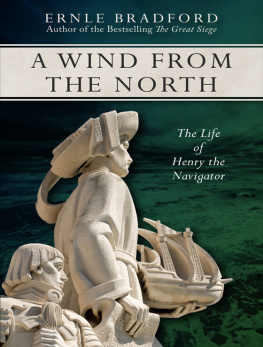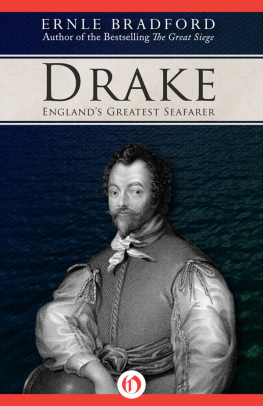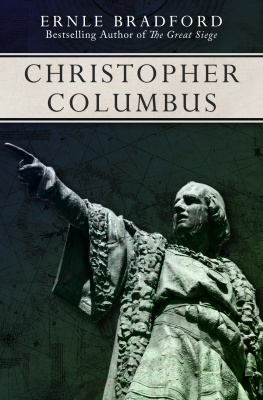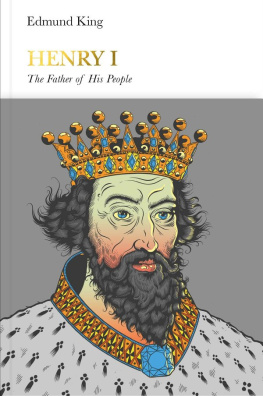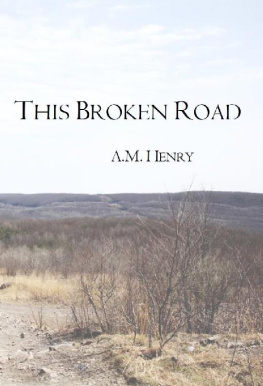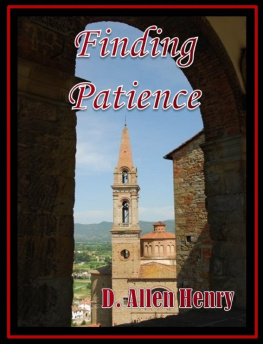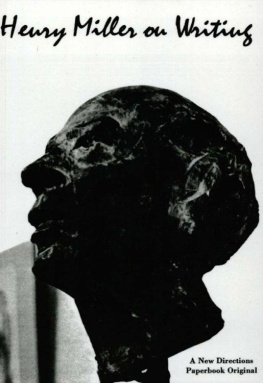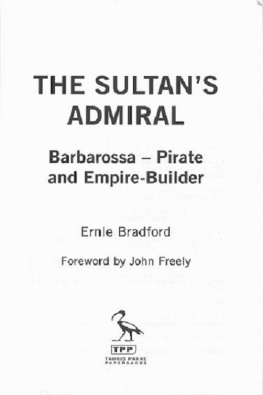A WIND FROM THE NORTH - THE LIFE OF HENRY THE NAVIGATOR
ERNLE BRADFORD
Copyright 1960 by Ernle Bradford.
Published by E-Reads. All rights reserved.
What is Alexander crowned with trophies at the head of his army, compared with Henry contemplating the ocean from his window on the rock of Sagres?
W. J. MICKLE, 1775
PREFACE
Enthusiasm fathered this book. I am not a Portuguese scholar or a historian of any distinction, so it may seem an impertinence to have attempted a biography of Portugals great national hero. My interest in Prince Henry came about by accident. Some years ago, I was sailing in a small yacht from Gibraltar to the West Indies and by chance called in at the port of Safi on the Moroccan, coast There was one building that immediately impressed meand which still remains in my memorythe old Portuguese fortress or the heights surmounting the town. It was the first I had ever seen, but I know now that there are many such fortresses on lonely coves and headlands throughout the world, or overlooking flourishing cities and big modern ports. They are the monuments to the Portuguese sailors and pioneers who opened the sea lanes of the world and blazed the trail that was afterward followed by all the other maritime nations. It was on this same voyage that I sailed to the Canaries, and then took my departure for the New World from the Cape Verde Islands. I found again that I was following in the footsteps of the Portuguese, men who in boats little bigger (and much more primitive) than my forty-foot yacht had preceded m( by at least five centuries.
A few years later I sailed in a small yacht to Lisbon and down the coast of Portugal to Cape St. Vincent and Sagres. The shadow of the Navigator lies heavy across that stretch of sea. I felt that he had been unfairly neglected in the English-speaking countries. Since then I have sailed to Madeira and the Azoreson each occasion in a boat of about twenty tons, a little smaller perhaps than the caravels of Prince Henrys time, but equipped with modern charts, efficient instruments, and a navigational knowledge, all of which stemmed from Prince Henry and his pioneers. A practical acquaintance with sailing, seamanship, and navigation, in the areas in which the Portuguese made their first voyages, gave me an added appreciation of the problems they had to face. In a crossing by yacht from the Azores to New York, I alsoby sheer chancefollowed a route very similar to that which Diogo de Teive must have taken when he sailed from Flores to the Newfoundland Banks.
I have anglicized the names of many of the principal characters in this biographythus, Prince Henry for the Infante Dom Henrique and Prince Peter for the Infante Dom Pedro. In other respects I have followed the Portuguese spellings, except in the case of certain geographical place names where I have preferred those better known to English-speaking marinerssuch as Cape Blanco for Cabo Branco and so on.
None of the dialogue is invented, although in many cases I have paraphrased or modernized the diction slightly. The biographer of Prince Henry is fortunate in having so reliable a contemporary chronicler as Azurara to draw on for his source material. Other principal authorities I have indicated at the end of this book, but I must not omit to mention the debt that any historian of the period must owe to the researches of R. H. Major in the nineteenth century. I am indebted for his kindness and help to Sr. A. B. F. Mendes, director of the Casa de Portugal, London, also to the authorities of the British Museum, the National Maritime Museum, Greenwich, the Royal Academy of Arts, Burlington House, and the Museum of Ancient Art, Lisbon. The researches of Sr. Quirino da Fonseca on the ships of Prince Henrys time are invaluable to any biographer of the Prince.
Prince Henry has had his detractors as well as admirers, and any who feel that I may have taken too favorable a view of him and his achievements are recommended to read J. P. Oliveira Martinss classic The Golden Age of Prince Henry the Navigator for an adverse view of the Prince.
It is five hundred years since Prince Henry died, and a gulf not only of time, but also of psychology, separates him from us. In endeavoring to trace his character and to comprehend his outlook, I have inevitably had to draw on writings concerning the medieval Christian church. In this connection I would like to acknowledge my debt to R. H. Tawneys Religion and the Rise of Capitalism, and in particular to the section entitled The Mediaeval Background.
E. B.
Brixham, Devon.
1960
Bright with pennants and devices, the ships lifted over the horizon. They came onward in a half-moon shape, and their music sounded across the water, as gay and confident as the summer sky. Soon the leading vessels were nearing the mouth of the Tagus.
Another fleet waited to meet them. It bore the arms and emblem of the King of Portugal, and was commanded by Prince Peter, the Kings second son. The fleet that proudly advanced its sails toward the shining city of Lisbon was under the command of Peters younger brother, Henry, whose twenty-first birthday had been celebrated only a few months before. Thousands of people from Lisbon thronged the banks of the great river to watch the two fleets meet. They did not know on what venture the King and his sons were engaged. They only knew that the preparations for this day had occupied every shipbuilder, sailmaker, victualer, and chandler in Portugal for the past year and more. The lighter craft came first, wafting over the bar at the mouth of the river. They were small boats of fifty tons and less, spreading their new sails to the lazy onshore wind. Behind them sauntered the tubby shapes of the first-class ships, their square sails puffing and lifting as they met the swell at the river mouth. Behind these again came the lean greyhounds: the oared galleys, whose design had changed little since the Phoenicians and the Romans had made the Tagus their anchoring place.
The names of the ships had a poetry of their own. In the front echelon of light sailing boats were carracas and fustas, balenares, pinazas, and carabelas. Then there were the barcas, their broad-beamed hulls flickering with the arms of soldiers. The oared vessels, moving like insects over a pond, were galleys and galeotas, tardantes, and saetias. In these two types of ship the traditional Mediterranean was united with the new commercial world of the north; the first represented by the galley, and the latter by the high-pooped trading bark. But the gull-winged carabelas, which crossed the bar first, were the forerunners of a new type of ship, one that would dredge an undiscovered world and a thousand new coastlines out of the uncharted rollers of the Atlantic.
As the fleets of the two princes met, the music from their garlanded poops blended with the time-keeping gongs aboard the galleys, and the brassy note of trumpets from the barks. The onlookers cheered, as a hundred and one small rowing boats put off to accompany the fleet to its anchorage. Church bells sounded, dim in the blue distance, and the midsummer heat shook over the hills beyond the city. Catching the slants of wind that dropped down the river mouth, and with the thrust of the tide giving them way against the current of the river, the ships moved slowly upstream. They dropped anchor under the golden walls of Belm on the outskirts of Lisbon. The oars of the galleys were secured, the sails of the barks and pinnaces were furled, and the graceful lateen-rigged carabelas idled over their reflections in the quiet water.
It was July, 1415. The building of so many shipsover twenty oared galleys, twenty-six barks, and many dozen lighter crafthad occupied the whole seaboard of Portugal for over three years. The destination of the fleet had occupied the councils of Europe for almost as long.
Next page
